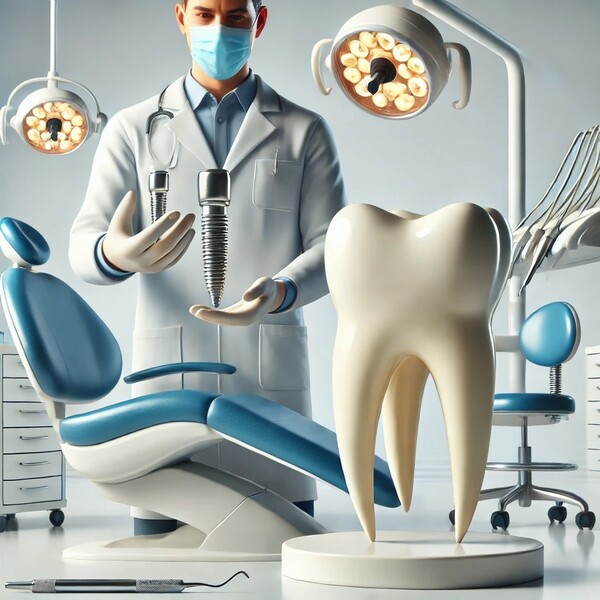If you’re considering replacing a missing tooth, dental implants may be the perfect solution. Dental implants are a long-lasting and natural-looking option that many people turn to for restoring their smile and improving their oral health. In this article, we will dive into what dental implants are, the benefits they offer, the procedure, and more.
What is a Dental Implant?
A dental implant is a surgical device placed in the jawbone to support a replacement tooth or bridge. Made from biocompatible materials such as titanium, dental implants integrate with your jawbone through a process called osseointegration. This makes them a durable and reliable alternative to dentures or bridges.
Dental implants are often the best option for people who have lost a tooth due to decay, injury, or other dental conditions. They provide a strong foundation for artificial teeth, offering stability and a natural look that traditional dentures cannot match.
The Benefits of Dental Implants
Dental implants offer numerous benefits that make them a popular choice among individuals with missing teeth. These benefits include:
-
Improved Appearance: Since dental implants look and feel like natural teeth, they provide a seamless appearance. The replacement tooth or crown is custom-designed to match the color and shape of your natural teeth.
-
Better Speech: Unlike dentures, which may slip and cause you to mumble or slur words, dental implants are fixed securely in place. This allows you to speak confidently without worrying about your prosthetic teeth moving.
-
Enhanced Comfort: Dental implants become part of your mouth and eliminate the discomfort associated with removable dentures.
-
Improved Oral Health: Unlike traditional bridges, which require altering adjacent healthy teeth, dental implants do not affect neighboring teeth. This helps preserve the integrity of your natural teeth and overall oral health.
-
Long-Term Durability: Dental implants are designed to last many years, often a lifetime, with proper care. This makes them a cost-effective choice in the long run.
-
Increased Confidence: Dental implants restore your ability to smile, eat, and speak without fear, boosting your self-esteem and confidence.
The Dental Implant Procedure
The dental implant procedure is typically performed in several stages. Here’s what you can expect when you undergo a dental implant procedure:
-
Consultation and Examination: The first step is a consultation with your dentist. During this appointment, they will evaluate your oral health and determine whether you are a good candidate for dental implants. This includes taking X-rays and possibly a CT scan to assess your bone structure.
-
Placement of the Implant: The next step is the surgical placement of the dental implant into the jawbone. This is done under local anesthesia to ensure you are comfortable during the procedure. The implant is placed into the bone, and a healing period is required to allow osseointegration to take place.
-
Healing and Integration: Over the next few months, the implant will fuse with your jawbone, providing a strong foundation for your new tooth. This process can take several months to complete, depending on how quickly your bone integrates with the implant.
-
Placement of the Abutment: Once the implant has fully integrated, your dentist will place an abutment on top of the implant. This piece connects the implant to the replacement tooth or crown.
-
Attachment of the Replacement Tooth or Crown: Finally, your dentist will attach a custom-made replacement tooth or crown to the abutment. This tooth is designed to match the shape and color of your natural teeth, ensuring a seamless and natural appearance.
Are You a Candidate for Dental Implants?
Dental implants are suitable for most people who have lost a tooth or multiple teeth. However, there are a few factors that may influence your candidacy for the procedure. These include:
-
Good Oral Health: To be a good candidate for dental implants, you must have healthy gums and sufficient bone mass in your jaw to support the implant. If your jawbone has deteriorated, a bone graft may be required to provide a strong foundation for the implant.
-
Age: While dental implants can be placed in adults of any age, the bones must have fully developed. This usually happens around the age of 18-20, making this the ideal age for the procedure.
-
No Severe Health Conditions: Certain health conditions, such as uncontrolled diabetes or active gum disease, may affect your ability to undergo dental implant surgery. Your dentist will assess your medical history to ensure the procedure is safe for you.
Cost of Dental Implants
The cost of dental implants can vary based on several factors, including the number of implants you need, the complexity of the procedure, and the location of the dental practice. On average, dental implants can cost between $1,500 and $4,000 per implant, not including the cost of the crown, abutment, or any additional procedures such as bone grafts.
While dental implants can be a significant investment upfront, their durability and longevity make them a cost-effective solution over time. Many dental insurance plans now offer coverage for dental implants, so it's worth checking with your provider to see if you're eligible for coverage.
Aftercare for Dental Implants
Proper aftercare is essential to ensure the long-term success of your dental implants. Here are some tips for caring for your new implants:
-
Good Oral Hygiene: Brush and floss your implants regularly, just like your natural teeth. Use a soft-bristled toothbrush and non-abrasive toothpaste to prevent damaging the implant or surrounding tissues.
-
Avoid Hard Foods: For the first few weeks after the implant is placed, avoid eating hard or sticky foods that may place excessive pressure on the implant.
-
Regular Checkups: Visit your dentist for regular checkups to ensure your implants are functioning properly and to catch any potential issues early.
-
Avoid Smoking: Smoking can interfere with the healing process and increase the risk of implant failure. If you're a smoker, quitting can improve your chances of success.
Risks and Complications of Dental Implants
Although dental implants are a safe and effective procedure, there are some risks and potential complications. These include:
-
Infection: As with any surgical procedure, there is a risk of infection. Proper aftercare and following your dentist’s instructions can help minimize this risk.
-
Implant Failure: In some cases, the implant may fail to integrate with the bone, leading to the need for removal and replacement.
-
Nerve Damage: In rare cases, the implant may damage nerves in the jaw, leading to numbness or tingling in the lips, gums, or chin.
Despite these risks, dental implants are generally considered a safe and reliable solution for tooth replacement.
Conclusion
Dental implants are a revolutionary solution for individuals with missing teeth. Offering numerous benefits, including improved appearance, comfort, and oral health, they are a long-term investment in your smile and confidence. By understanding the procedure, potential risks, and aftercare requirements, you can make an informed decision about whether dental implants are right for you.
If you’re considering dental implants, consult with an experienced dentist to discuss your options and determine the best treatment plan for your needs.



